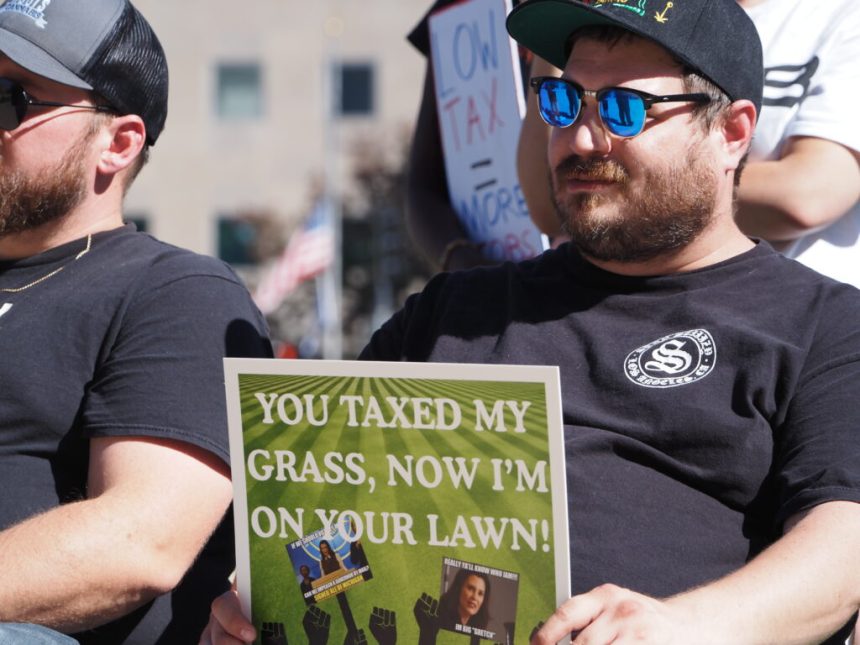Cannabis industry advocates and workers rally advocating against a proposed 24% wholesale tax on marijuana for the next fiscal year. Sept. 30, 2025 | Photo by Ben Solis/Michigan Advance
The proposed new wholesale tax on marijuana products to fund road repairs in the next state budget and years down the road is much too high and would result in job losses for a booming Michigan cannabis industry, advocates and lawmakers said Tuesday as they rallied for a lower tax rate.
At least two Democratic lawmakers who attended the rally – state Reps. Donavan McKinney of Detroit and Mike McFall of Hazel Park – also signaled that they were working behind the scenes to get that rate much lower before a final vote is taken.
At present, both McFall and McKinney said they would vote no on the final budget if the rate remained.
Michigan lawmakers reached a loose framework to fund the government last week, but it included a new 24% wholesale tax on products sold at dispensaries across the state. That sent the cannabis industry and their allies into a frenzy as they warned that such a tax would hamstring the industry’s growth and result in fewer jobs.
One of the signs used by cannabis industry advocates and workers advocating against a proposed 24% wholesale tax on marijuana for the next fiscal year. Sept. 30, 2025 | Photo by Ben Solis/Michigan Advance
On Tuesday, lawmakers were still in the throes of hammering out a final budget plan, with no clear end in sight despite signals that the government would stay open and not shut down on Wednesday when the new fiscal year begins.
Still, the money for the Legislature’s road funding plan had to come from somewhere, whether that was from schools – which advocates rallied against Tuesday – or from the new proposed tax on pot for potholes.
Those working for or on behalf of the cannabis industry gathered for a rally on the Capitol steps in Lansing to send lawmakers and Gov. Gretchen Whitmer, who had earlier in the year proposed a more than 30% tax, a clear message: Keep off their grass.
“Our industry is not their piggy bank. Our wallets are not their budget overruns,” said Mike DiLaura, CCO and general counsel for House of Dank, one of many cannabis companies operating in Michigan. “It is our time, not just as an industry, but as citizens of this great state, to put our feet down and say, ‘enough is enough.’”

Mike DiLaura, CCO and general counsel for House of Dank, one of many cannabis companies operating in Michigan, speaks at a rally advocating against a proposed 24% wholesale tax on marijuana for the next fiscal year. Sept. 30, 2025 | Photo by Ben Solis/Michigan Advance
DiLaura continued by saying that the industry has, since recreational cannabis was legalized in 2020, raised nearly $2 billion in taxes for Michigan over the last five years.
“But they say it’s not enough,” DiLaura said. “When will it ever be enough?”
Several other advocates and industry leaders spoke at the rally, all mentioning that even if they lost the battle to either stop the tax hike or reduce it, they would continue the fight in court or seek a full repeal of the law down the pike.
The rally also featured two allies in McKinney and McFall.
Both said they voted against the proposal in House Bill 4951 when it passed the House last week, noting that their communities have greatly benefited from recreational cannabis shops and associated businesses like grow operations.
“Hazel Park was all in on marijuana from the very beginning. As some of you might know, we even gave Tommy Chong the key to the city at one point,” McFall said. “But what a lot of people don’t realize is how this is going to impact local municipalities. They’re talking about cutting revenue sharing, which is the money that goes back from the state. This is also going to impact that.”

Michigan state Rep. Donavan McKinney (D-Detroit) speaks at a rally advocating against a proposed 24% wholesale tax on marijuana for the next fiscal year. Sept. 30, 2025 | Photo by Ben Solis/Michigan Advance
McFall said Hazel Park got half a million in tax dollars last year, and that money helped pay for emergency services and other amenities.
McKinney said that the Eight Mile corridor is filled with marijuana shops that have transformed vacant, abandoned buildings while also delivering what he called the best marijuana in the nation.
“I think Snoop Dogg said something like that,” McKinney quipped.
But in all seriousness, he said that the proposal was “BS,” and the new tax rate was too high. McKinney added that he and McFall were just two of a few legislators who were willing to stand firm against the proposal, and that there was work going on behind closed doors to lower the rate if it was absolutely necessary to fund roads.
“We don’t know what that number will be, but we for sure know it’s not going to be 24%,” McKinney said.
SUBSCRIBE: GET THE MORNING HEADLINES DELIVERED TO YOUR INBOX









